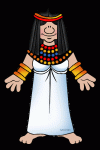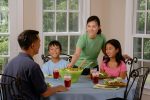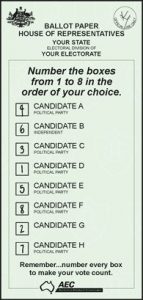This week our younger students are preparing for their play/ role-playing presentation, whilst older students are practising a full preferential count to determine the outcome of their Class Election.
 Foundation/Prep/Kindy to Year 3
Foundation/Prep/Kindy to Year 3
Our youngest students in Foundation/Prep/Kindy (Unit F.4) and integrated classes with Year 1 (Unit F-1.4) are working on the costumes, props and practising getting into character for their People in the Past play. These activities help students to understand the differences and similarities between our lives and those of people in the past. Teachers can use the activities to facilitate discussions around these points. Students in Years 1 (Unit 1.4), 2 (Unit 2.4) and 3 (Unit 3.4) are also preparing for their Different Families Around the World presentation. Students in Year 1 are concentrating on identifying different family members and their roles within the different family structures. Students in Year 2 focus on where the families live, what places are special to them and compare these to the students’ own lives. Students in Year 3 examine communities and how celebrations and special occasions within the community are shared by the families.
Years 3 to 6
 Students in Years 3 (Unit 3.8), 4 (Unit 4.4), 5 (Unit 5.4) and 6 (Unit 6.4) are in the midst of their Class Election activity. This week they determine the outcome of the election, an exciting moment! The result is determined by a full preferential vote count. Using the resource, Preferential Voting, students learn how preferences are allocated on a vote by vote basis. Students who have been chosen to be Election Officers will lay out the ballot papers according to the first preference votes, and then re-allocate the votes according to second preferences, choosing the candidate with the lowest number of votes as the first to have their votes re-allocated. This process is repeated until only 2 piles of votes (for 2 candidates) remain. The teacher can then explain that this stage is called “Two Party Preferred”. Finally the winning candidate, with the highest number of votes, is announced and students then compare this result to the first preference vote to see if there have been any changes. Where there is a clear winner, there will often be no changes, but in a tight result the flow of preferences can make a significant difference.
Students in Years 3 (Unit 3.8), 4 (Unit 4.4), 5 (Unit 5.4) and 6 (Unit 6.4) are in the midst of their Class Election activity. This week they determine the outcome of the election, an exciting moment! The result is determined by a full preferential vote count. Using the resource, Preferential Voting, students learn how preferences are allocated on a vote by vote basis. Students who have been chosen to be Election Officers will lay out the ballot papers according to the first preference votes, and then re-allocate the votes according to second preferences, choosing the candidate with the lowest number of votes as the first to have their votes re-allocated. This process is repeated until only 2 piles of votes (for 2 candidates) remain. The teacher can then explain that this stage is called “Two Party Preferred”. Finally the winning candidate, with the highest number of votes, is announced and students then compare this result to the first preference vote to see if there have been any changes. Where there is a clear winner, there will often be no changes, but in a tight result the flow of preferences can make a significant difference.
Undertaking this activity themselves, seeing the votes counted and re-allocated according to preferences and comparing what happens at different stages of the process gives student a deep understanding of how our Australian electoral system works. This will stand them in good stead as they grow up to be responsible citizens with a full understanding of their civic duties and rights and the power of their vote and how to use it effectively.

 Foundation/Prep/Kindy to Year 3
Foundation/Prep/Kindy to Year 3
 Students in Years 1 (
Students in Years 1 ( Students in Years 3 (
Students in Years 3 ( For any Australian Curriculum HASS topic from Prep to at least Year 6, we can safely say “We have a resource on that!”
For any Australian Curriculum HASS topic from Prep to at least Year 6, we can safely say “We have a resource on that!” Students in Years 3 (
Students in Years 3 (
My 9 year old son fell in love with all the aspects of this little robotic guy - the simple…
Cara, Parent